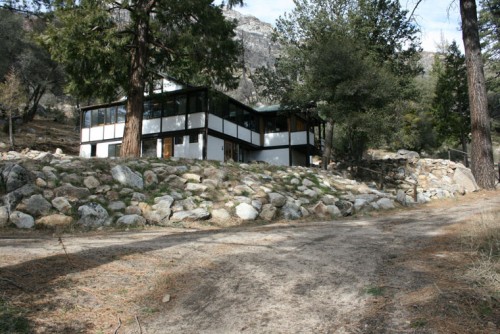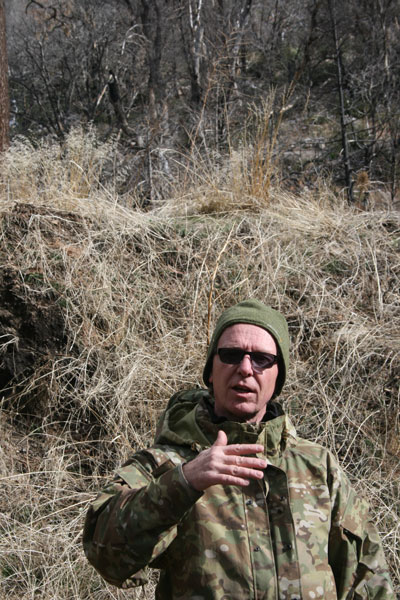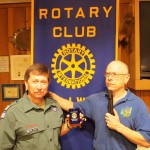
On the Yokoji-Zen Mountain Center home page, there is a quote. “Before enlightenment: chop wood carry water, after enlightenment: chop wood carry water.” No matter the level of enlightenment, the work of living continues.
That was especially true for Zen Center Abbot Charles Tenshin Fletcher, Roshi after the disastrous Mountain Fire of July 2013. A Manchester, England native and carpenter by trade, Tenshin needed all his carpentry and observation skills to help restore the center after a post-fire deluge of mud and debris. The center’s land is 160 acres that borders national forest. It sits on an abutment of land beneath steep slopes that, given their topography, form natural water courses. Without trees and vegetation, post-fire torrential rains carried tons of mud, debris, burnt trees and boulders down those waterways, seriously damaging the center.
After studying those water courses and being on site as more thunderstorms continued to drench

the center, Tenshin saw the natural directions the water took. He, center residents and staff spent two years, with the help of some volunteers, restoring the center. They dug enormous pits along water courses above and on the sides of the center to slow future water movement. They lined water channels with poured concrete to divert future water flow around buildings. They used tons of deposited debris and mud to create new raised land around impacted buildings. They stabilized that land with rocks and boulders that had been carried by the fast-moving waters. They built walk bridges over new water channels — bridges that could be easily raised if impending water flow threatened them.
This reporter, observing the incredible amount of diversionary and precautionary work the abbot, staff and residents had completed, expressed surprise at the scale of the completed work. Said Tenshin Fletcher, “It would probably take three storms as strong as the largest we’ve seen to overcome what we’ve done.” Then he smiled, as he does often, and said, “Not bad for a carpenter.”
What the center has accomplished is a cautionary tale for the rest of the Hill. First, be on your land when it rains to see where the water wants to go. Second, note how that flow could harm structures. Third, design or have someone else design water courses that divert flow and protect your structures. And do all that before the main part of El Niño begins next month.
Arguably, most of residential Idyllwild and Pine Cove will not experience the “perfect storm and flood” that Yokoji-Zen Mountain Center did. The center survived the Mountain Fire but almost did not survive the mud and debris deluge. The flow did not stop before reaching the center parking lot where it completely buried one car left on that relatively flat expanse.
The abbot’s keen observation of water-course runoff and his builder’s eye for site improvement have guided the two-year project to protect the center from future storms and mountain runoff. It has left the center in a very good position to survive whatever El Niño has in store.
Tenshin Fletcher, Roshi is the successor to center’s founding teacher, Taizan Maezumi, Roshi, who died in 1995. The center began as a summer training center in 1982. Since 1995, Yokoji has functioned as a year-round Zen training center for residents and non-residents under the direction of Tenshin Fletcher, Roshi.
From its inception, the center was built to be in harmony with nature. It draws its water from two gravity-filled wells. It survives off-grid, powered by solar panels (the name Yokoji means “sunlight temple”) and wind turbines.

As the center’s website notes, “The valley in which the Zen Center lies is a great teacher to us, all year round.”
A primary function of the abbot is to teach. As he also admits, it is to learn. And from the mountain, from its fierceness, from the ravages of water-carrying boulders weighing tons, the abbot and the center residents watched, learned and built — and built strongly.
For more about Yokoji-Zen Mountain Center, visit zmc.org.











Yeah, good stuff.